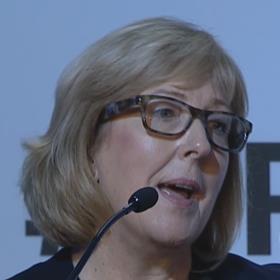By Fiona Reynolds, CEO, the PRI

This year, we’ve seen an unprecedented level of action around climate change in many parts of the world. But despite this activity, we still face an uphill battle. As UN climate chief Patricia Espinosa noted at COP25 in Madrid, “we have been struggling.”
With so little concrete action taking place in 2019, it is imperative that we ensure 2020 becomes a defining year for climate action. In January 2020 at Davos, environmental issues will be prominent on the agenda, including how to mobilise business to respond to the risks of climate change.
Through our Inevitable Policy Response work programme, we have been seeking to make the point to governments and investors that action on climate change cannot wait. This week, we released a report, with modelling from Vivid Economics and Energy Transition Advisors, which forecast that tighter government climate regulations by 2025 could wipe up to US$2.3 trillion off the value of companies in industries ranging from fossil fuel producers to agriculture and car makers. Most exposed is the fossil fuel sector which could lose one third of its current value, The shift would nevertheless also lead to winners. For example, auto makers heavily invested in electric vehicles and electric utility firms using low-carbon power could more than double their values.
In recent months, we’ve seen asset owners stepping up their climate ambitions, with 16 asset owners committing to the UN Net Zero Asset Owner Alliance, working towards net zero by 2050. And, we continue to see global investors putting pressure on governments via the Global investor statement to governments on climate action, which has now been signed by 631 investors representing well over USD $37trillion in assets.
The Climate Action 100+ initiative released its 2019 progress report, which underscored how investors are seeking to influence the world’s top emitters when it comes to governance on climate change. The report showed that, while a majority of companies are setting targets on emissions, there is a still a great deal of work to be done, especially in the area of climate lobbying.
Our latest releases
In addition to climate change, the validity of ESG issues generally continues to be challenged in some parts of the world. We strongly disagreed with proposals by the SEC in the US that would create roadblocks for investors seeking to raise ESG issues with company boards. The PRI believes that these proposals are in direct violation of the SEC’s stated purpose, which is to protect investors and calls on signatories to sign a letter to the SEC to oppose these changes.
The PRI has long affirmed that looking at ESG issues is part of fiduciary duty. We released our Fiduciary duty in the 21st century final report, which reiterates that fiduciary duty requires the incorporation of ESG issues into investment analysis and decision making.
For investors who may be looking for a quick overview of RI and how it relates to different asset classes, we have launched An introduction to responsible investment series, part of the PRI’s new mini-guides covering different areas of responsible investment.
Looking towards progress on social issues, the PRI welcomed the release of the final blueprint from the Liechtenstein Initiative’s Financial Sector Commission on Modern Slavery and Human Trafficking, which includes a toolkit for investors on how they can address this issue within their organisations. As chair of the Commission, I know how serious this issue is, not just from a moral standpoint but also the material risks that investors face from trafficking and modern slavery. We must stand up for the estimated 40.3 million people in modern slavery around the world.
The PRI was delighted to welcome so many of you to PRI in Person in Paris this year, where we announced our first Leaders’ Group consisting of 47 asset owners who have been identified based on their impressive work in selecting, appointing and monitoring investment managers in listed and/or private equity. We hope that these leaders will inspire others across our signatory base to look at best practices in manager selection.
How we’ve grown
Throughout the year, our signatory base has continued to show impressive growth. Over the last quarter, we welcomed 145 new signatories. Areas of strong growth continued to be in the US (+34), UK +(22), the Nordics (+10) and Germany (+ 10, six of whom are insurers).
In order to better serve our signatory base, we continue to strengthen our international teams. In France, Ben Leblique, currently part of the signatory relations team in London, will move to France to become our new relationship manager for France. We have also hired Ben Newsom as head of signatory operations in London.
As many of you know, we held our board elections last month, with Hiro Mizuno from GPIF and Eva Halvarsson from AP2 re-elected in the asset owner positions and Michael Jantzi of Sustainalytics elected for the service provider position. We welcome Michael on board. We are grateful to all our board members for their unwavering support of sustainability issues. We thank Peter Webster of Vigeo Eiris, our outgoing board member for his many years on the board and for the tremendous contribution he has made.
As we look towards 2020, there is a huge amount of work ahead of all of us if we are to see real action and commitment on climate change. It is a daunting challenge, without a doubt, but we think that working in tandem with our signatories, and the collective financial muscle that they represent, we can make 2020 a pivotal year not only for action on climate change but on ESG issues worldwide.












